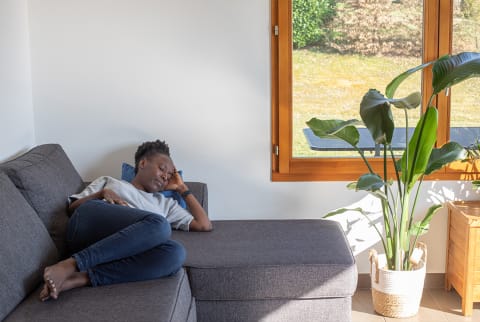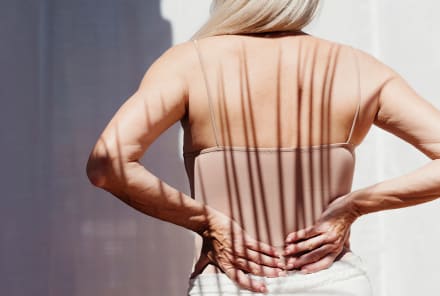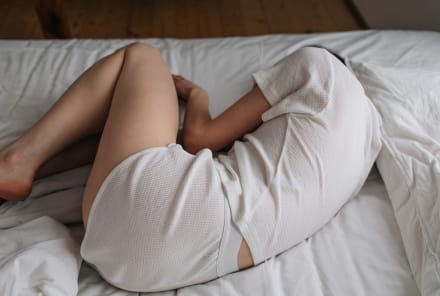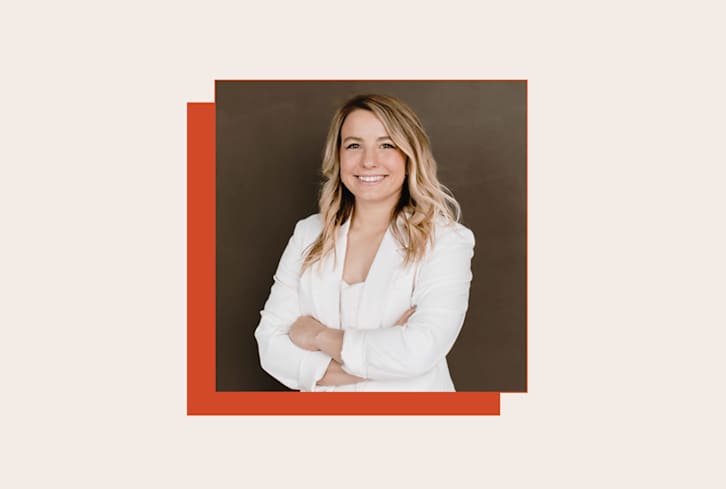Advertisement
This Is The Biggest Barrier To Sleep If You're 60+, Study Finds


Existing research has shown that as we get older, our sleep tends to suffer. And according to a new study out of Finland, published in the Journal of Occupational & Environmental Medicine, there's one thing that a lot of adults in their 60s seem to be losing sleep over. Here's what the research shows.
Studying how stress affects sleep in older adults.
For this study, researchers wanted to assess how different kinds of stress affected the sleep of older adults who were approaching retirement. The first study consisted of over 2,700 adults and looked at factors like physical and mental working conditions, stressful life events, and work-life balance.
An additional population study of nearly 4,000 people found that over half of Finnish men in their 60s and 70% of women had reported sleeping difficulties within the past month.
Taking the results of both studies, the researchers were able to distinguish four factors or components associated with stress: physical workload and shift work, psychosocial workload, social and environmental nonwork adversity, and life event and/or health-related nonwork adversity.
As professor of psychology and study co-author Marianna Virtanen, Ph.D., explains in a news release, "The more an employee had work and nonwork stressors, the more problems they also had with sleep."
The researchers also note that different kinds of stress affect sleep in different ways. Work-related stress, for instance, was linked to ongoing sleep problems, whereas non-work-related stress predicted more sleep problems moving forward. Working conditions were also associated with sleep quality, and, you guessed it—poorer conditions meant poorer sleep.
What to do about it.
There's no doubt that stress in all its forms can seep into your quality of sleep, and according to Virtanen, these findings call out the importance of work-life balance, particularly during stressful times.
"Especially when there are stress factors in private life, such as severe illness or death in the family, or being an informal caregiver for someone, flexible working hours are an important target for development," she says.
On top of that, taking other steps to mitigate stress in your life will only benefit your sleep hygiene. Whether that means taking up a stress-reducing activity like meditation or yoga, taking a stress-easing supplement, or making bigger changes in your life to get rid of what's stressing you out, your quality of sleep may depend on it.
And of course, it never hurts to get a little help in the sleep department, so you might consider trying a sleep-promoting supplement, such as mbg's sleep support+.* The unique formula combines the powerful effects of magnesium bisglycinate, which has been shown to promote a steady state of relaxation, as well as jujube for calming and sedation, and PharmaGABA® to enhance natural sleep quality through every phase of life.*
The takeaway.
Sometimes stress can't be avoided, but that doesn't mean our quality of sleep has to suffer. By tackling stress head-on, and emphasizing sleep hygiene, we can all get quality sleep every night—no matter our age.
Watch Next
Enjoy some of our favorite clips from classes
Enjoy some of our favorite clips from classes
What Is Meditation?
Mindfulness/Spirituality | Light Watkins
Box Breathing
Mindfulness/Spirituality | Gwen Dittmar
What Breathwork Can Address
Mindfulness/Spirituality | Gwen Dittmar
The 8 Limbs of Yoga - What is Asana?
Yoga | Caley Alyssa
Two Standing Postures to Open Up Tight Hips
Yoga | Caley Alyssa
How Plants Can Optimize Athletic Performance
Nutrition | Rich Roll
What to Eat Before a Workout
Nutrition | Rich Roll
How Ayurveda Helps Us Navigate Modern Life
Nutrition | Sahara Rose
Messages About Love & Relationships
Love & Relationships | Esther Perel
Love Languages
Love & Relationships | Esther Perel
What Is Meditation?
Box Breathing
What Breathwork Can Address
The 8 Limbs of Yoga - What is Asana?
Two Standing Postures to Open Up Tight Hips
How Plants Can Optimize Athletic Performance
What to Eat Before a Workout
How Ayurveda Helps Us Navigate Modern Life
Messages About Love & Relationships
Love Languages
Advertisement

This Supplement May Remarkably Benefit Those With A High Risk Of Alzheimer’s
Molly Knudsen, M.S., RDN

Want To Be Metabolically Healthy? Study Shows An Underutilized Approach
Molly Knudsen, M.S., RDN

Don’t Eat A Lot Of Meat? Make Sure You Take This Supplement Daily
Molly Knudsen, M.S., RDN

Study Reveals 2 Habits That Are Early Signs Of Muscle Loss In Women
Molly Knudsen, M.S., RDN

This Supplement May Remarkably Benefit Those With A High Risk Of Alzheimer’s
Molly Knudsen, M.S., RDN

Want To Be Metabolically Healthy? Study Shows An Underutilized Approach
Molly Knudsen, M.S., RDN

Don’t Eat A Lot Of Meat? Make Sure You Take This Supplement Daily
Molly Knudsen, M.S., RDN

Study Reveals 2 Habits That Are Early Signs Of Muscle Loss In Women
Molly Knudsen, M.S., RDN

This Supplement May Remarkably Benefit Those With A High Risk Of Alzheimer’s
Molly Knudsen, M.S., RDN

Want To Be Metabolically Healthy? Study Shows An Underutilized Approach
Molly Knudsen, M.S., RDN

Don’t Eat A Lot Of Meat? Make Sure You Take This Supplement Daily
Molly Knudsen, M.S., RDN

Study Reveals 2 Habits That Are Early Signs Of Muscle Loss In Women
Molly Knudsen, M.S., RDN

This Supplement May Remarkably Benefit Those With A High Risk Of Alzheimer’s
Molly Knudsen, M.S., RDN

Want To Be Metabolically Healthy? Study Shows An Underutilized Approach
Molly Knudsen, M.S., RDN

Don’t Eat A Lot Of Meat? Make Sure You Take This Supplement Daily
Molly Knudsen, M.S., RDN

Study Reveals 2 Habits That Are Early Signs Of Muscle Loss In Women
Molly Knudsen, M.S., RDN











